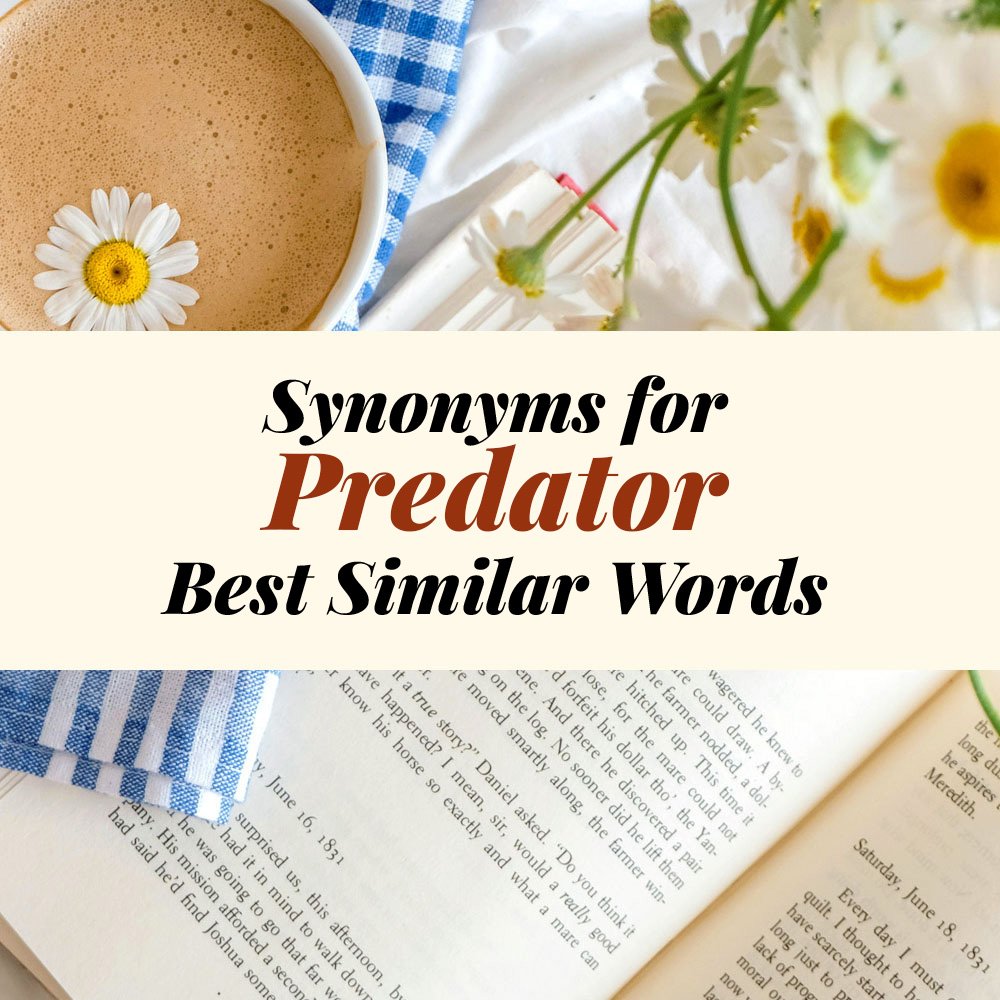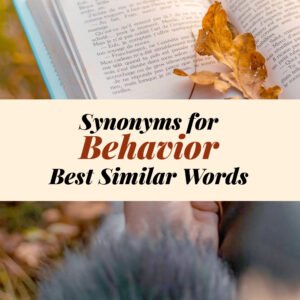When we talk about a predator, it usually refers to someone or something that hunts, takes advantage, or attacks others. Sometimes, we may want to use different words like hunter, attacker, or stalker to make our sentences more interesting. In this article, we will explore 17 different words you can use instead of predator, with examples for each.
| Synonym | Example |
|---|---|
| Hunter | The hunter quietly tracked the deer through the forest. |
| Attacker | The attacker surprised everyone during the game. |
| Stalker | She felt scared when she realized a stalker was following her. |
| Carnivore | Lions are powerful carnivores that hunt for food in the wild. |
| Beast | The beast roamed the night, looking for its prey. |
| Marauder | The marauder took everything from the village while no one was looking. |
| Prowler | A prowler was seen near the houses at midnight. |
| Robber | The robber sneaked into the bank and stole money. |
| Invader | The invader crossed the borders without permission. |
| Predator Bird | The predator bird swooped down and caught a mouse. |
| Chaser | The chaser ran fast to catch the ball. |
| Predator Fish | The predator fish attacked smaller fish in the tank. |
| Lurker | The lurker waited silently behind the bushes. |
| Killer | The killer shocked the town with unexpected attacks. |
| Aggressor | The aggressor started the fight without warning. |
| Hunter Animal | The hunter animal moves quietly and waits for prey. |
| Pursuer | The pursuer chased the thief until he was caught. |
17 Different Ways to Say PREDATOR: Another Word for Predator
Hunter
The word hunter is one of the best ways to describe a predator because it focuses on the action of searching and chasing for prey. You can use this word when talking about animals or people who actively seek something. It is a good choice when the focus is on the effort and skill involved in hunting. This word gives a clear picture that someone or something is trying to catch or get another. Use it in stories, descriptions, or explanations about wildlife, games, or even competitive situations.
- The hunter quietly tracked the deer in the forest.
- She became a hunter of rare books in the market.
- The hunter waited patiently for the rabbit to appear.
- In the movie, the hunter followed the villain for days.
Attacker
Attacker works well when you want to highlight someone who aggressively targets another. This word is often used in situations involving danger or conflict. You can use it in sports, stories, or real-life situations where someone is on the offensive. It helps show action and intensity, giving readers a clear image of the situation. This word is very common in news reports or fictional fights because it focuses on the one who strikes first.
- The attacker surprised everyone during the game.
- Police caught the attacker after a long chase.
- The attacker entered the building without warning.
- He became an attacker in the online debate.
Stalker
The word stalker is perfect when someone follows another person secretly or in a threatening way. It shows danger and fear, which makes it ideal for suspenseful stories or warnings. You can use it when describing someone who is obsessive, watching quietly, or planning to act. This word fits situations where the behavior is unwanted and scary. Stalker gives a strong emotional impact to the sentence because it is linked with fear and privacy invasion.
- She felt scared when she realized a stalker was following her.
- The stalker watched from behind the trees.
- He became a stalker in the online group.
- The movie showed a stalker waiting in the shadows.
Carnivore
Carnivore is used mainly for animals that eat meat, making it a natural way to describe predators in the wild. It emphasizes the diet rather than the hunting style, which makes it good for educational or scientific content. You can use this word when explaining animal behavior or food chains. Carnivore clearly shows that the creature depends on hunting other animals for survival. It works well in both formal explanations and story contexts about nature.
- Lions are powerful carnivores that hunt for food.
- The carnivore quickly attacked the smaller animal.
- Wolves are known carnivores in the forest.
- The documentary explained how carnivores live in the wild.
Beast
The word beast is strong and works for any large or dangerous animal that hunts. It gives a feeling of power and fear. You can use it for animals, monsters, or even people who act aggressively. Beast works well in storytelling and describing scary situations. It adds drama and emphasizes strength and danger, making your sentences more exciting.
- The beast roamed the night, looking for prey.
- The villagers feared the beast in the mountains.
- A beast attacked the travelers near the river.
- Legends told of a beast that lived in the dark forest.
Marauder
Marauder describes someone who attacks, steals, or causes chaos, often unexpectedly. This word is good when the focus is on theft or mischief. Use it for historical stories, pirate tales, or any situation with sudden attacks. Marauder gives a sense of lawlessness and danger, making the sentence exciting and vivid. It shows someone actively taking what is not theirs.
- The marauder took everything from the village.
- Pirates are known as ruthless marauders.
- A marauder entered the castle at night.
- The villagers hid when a marauder approached.
Prowler
The word prowler is perfect for someone who moves quietly and secretly, usually to commit a crime or cause trouble. It is often used at night or in urban settings. This word creates suspense and a sense of caution. You can use it in stories, news, or warnings about safety. Prowler shows stealth and careful planning, making it great for tension-filled sentences.
- A prowler was seen near the houses at midnight.
- The cat prowler sneaked around the garden.
- Police chased the prowler through the alley.
- The story described a prowler hiding in the shadows.
Robber
Robber focuses on someone who steals by force. It highlights the crime aspect more than the hunting or chasing. This word is useful for crime stories, news, or history. Robber gives a clear idea that someone took something valuable unlawfully. It is easy to understand and works in many sentences where danger or theft is involved.
- The robber sneaked into the bank and stole money.
- A robber tried to take the jewels from the store.
- Police arrested the robber quickly.
- The story was about a clever robber in the city.
Invader
The word invader is best when describing someone or something entering a place without permission. It is perfect for wars, history, or nature attacks. You can use it to show intrusion or unwanted presence. Invader gives a strong sense of disruption and conflict. It is useful in both factual writing and storytelling, especially when showing danger or tension.
- The invader crossed the borders without permission.
- The castle was attacked by invaders.
- Nature invaders took over the small island.
- The invader was stopped by the soldiers.
Predator Bird
Predator bird describes birds that hunt other animals. This word is great for nature and wildlife topics. It emphasizes the bird’s hunting skill and sharpness. Use it when talking about eagles, hawks, or owls. Predator bird gives a clear picture of action in the wild. It also shows precision and speed in hunting.
- The predator bird swooped down and caught a mouse.
- Eagles are strong predator birds.
- The predator bird watched the field carefully.
- Nature documentaries often show predator birds hunting.
Chaser
Chaser is good when someone or something follows quickly to catch another. It shows energy and movement. Use it for sports, games, or exciting stories. Chaser is simple and direct, making sentences dynamic. It works for people, animals, or even objects in action.
- The chaser ran fast to catch the ball.
- A chaser followed the thief quickly.
- Dogs are great chasers during races.
- The story described a chaser in a thrilling game.
Predator Fish
Predator fish refers to fish that hunt smaller fish or other animals in water. It is useful in science, nature, and aquariums. This term focuses on the hunting behavior of fish. Use it to describe attacks in rivers, lakes, or oceans. Predator fish makes sentences informative and specific.
- The predator fish attacked smaller fish in the tank.
- Sharks are powerful predator fish in the sea.
- Predator fish hide before striking their prey.
- Aquariums display predator fish with other species carefully.
Lurker
Lurker is someone or something that stays hidden, waiting for a chance to act. It is perfect for suspense or warning contexts. Lurker shows patience and secrecy. You can use it in stories, real-life warnings, or online situations. It adds tension and a sense of fear.
- The lurker waited silently behind the bushes.
- A lurker in the alley scared the children.
- He became a lurker in the online forum.
- Stories often describe a lurker waiting for the right moment.
Killer
Killer works when describing someone or something that can kill or destroy. It is very strong and dramatic. Use it in stories, news, or movies to create tension. Killer emphasizes danger and power. It can describe animals, people, or even objects that cause harm.
- The killer shocked the town with unexpected attacks.
- Sharks are considered killers of the sea.
- The killer storm destroyed the village.
- A killer in the movie chased the hero through the night.
Aggressor
Aggressor is ideal for someone who starts fights or attacks first. It highlights the action of being offensive. Use it in news, sports, or stories. Aggressor shows strength, boldness, and threat. It works well in conflicts where one party clearly attacks another.
- The aggressor started the fight without warning.
- During the game, the aggressor pushed the opponents.
- Soldiers acted as aggressors in the battle.
- Aggressors in the story caused fear among villagers.
Hunter Animal
Hunter animal is used for creatures that actively hunt to survive. It is clear and easy for nature and wildlife descriptions. You can use it for any animal that chases prey. Hunter animal focuses on the behavior and skill of hunting. It helps explain survival and food chains.
- The hunter animal moves quietly and waits for prey.
- Wolves are smart hunter animals in the forest.
- The hunter animal attacked only when ready.
- Nature shows hunter animals in action every day.
Pursuer
Pursuer shows someone who follows another to catch or reach them. It is great for stories, games, and sports. Pursuer emphasizes effort, speed, and determination. You can use it for people, animals, or even vehicles chasing a target. Pursuer gives an exciting feeling of movement and tension.
- The pursuer chased the thief until he was caught.
- A pursuer followed the runner through the streets.
- Predator animals can be strong pursuers.
- The story described a pursuer catching the villain.

Final Thoughts
There are many ways to say predator, and each word gives a slightly different feeling or meaning. From hunter to aggressor, choosing the right synonym makes your writing more vivid and interesting. Use these words to describe actions, danger, and hunting effectively in your sentences.









